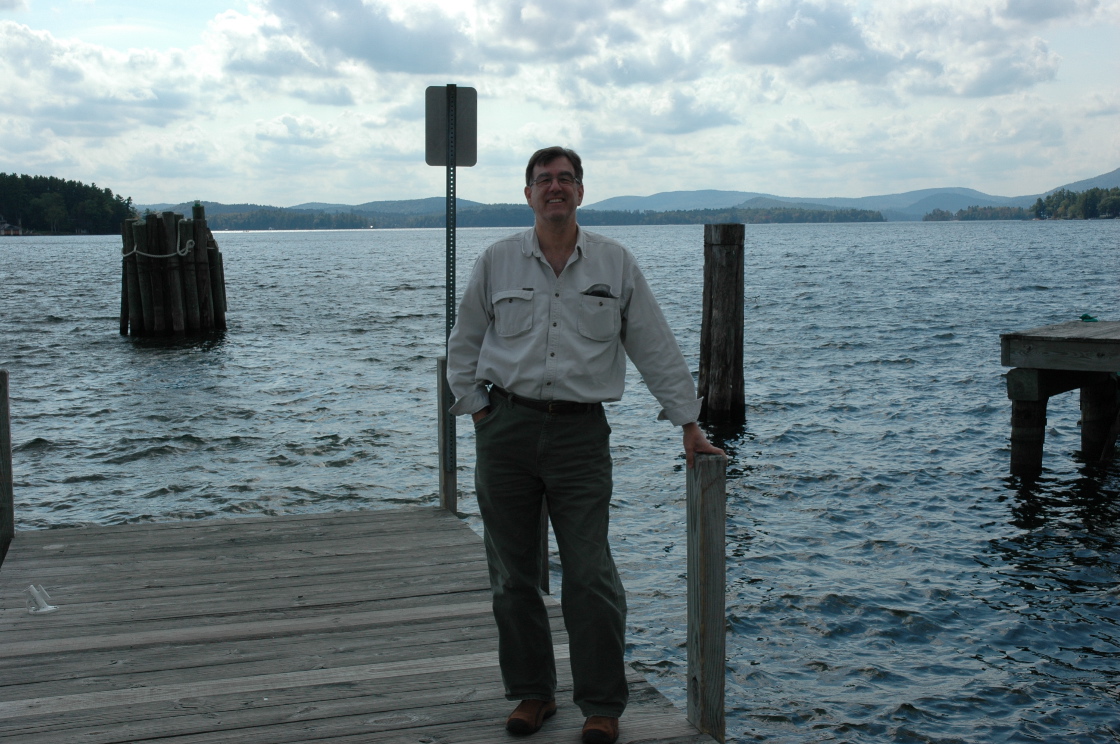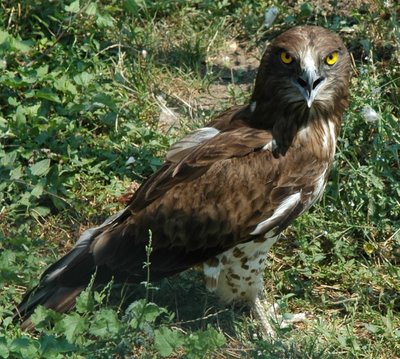Links
Archives
- May 2004
- June 2004
- July 2004
- August 2004
- September 2004
- October 2004
- November 2004
- December 2004
- January 2005
- February 2005
- March 2005
- April 2005
- May 2005
- June 2005
- July 2005
- August 2005
- September 2005
- October 2005
- November 2005
- December 2005
- January 2006
- February 2006
- March 2006
- April 2006
- May 2006
- June 2006
- July 2006
- August 2006
A chronicle of my experiences as a Peace Corps Community Organizational Development volunteer in Bulgaria.
Tuesday, August 29, 2006
All Good Things...
My time in country is now measured in days and my plans are centered on getting around to seeing all the people to whom I want to say 'good-bye'. This coming weekend I'll go to Saedinenie on Saturday and stay for the night. I'm bringing Veneta a Bulgarian-English dictionary so we can write letters back and forth. Plans are in the works for the girls from the film club to get together for a night of roasting marshmallows and making s'mores and I'll leave one of the two remaining video cameras with them. My sitemates in Stara Zagora and I will see each other off and on until I leave and have a final beer at Drums the night before I slink out of town. Brian and Kate and Sara will come to Sofia on my last night in the country and we'll have dinner together. Then, the next day, I'll catch a flight back to the States and my "excellent PC adventure" will officially have come to an end.
I'll return to a place where appliances and elevators tend to be unremarkable things that function as they are meant to and rarely develop personalities of their own. I'll drive or fly everywhere I want to go rather than catching an express bus or the 'fast' train. I'll eat fruits and vegetables that look physically perfect and taste like paper and buy eggs in cartons in the supermarket instead of from my 'egg guy' in the pazar. On the other hand, I won't have to put up an umbrella when I use the toilet and I won't have to choose which room to heat during the winter. I'll be home in time for the baseball playoffs and the football season.
I've sent in a couple of applications to the Peace Corps for jobs here and there. While I'm waiting to hear back from them, I'm preparing for the Foreign Service Oral Assessment. I'm scheduled to take it on October 16th in Chicago and I have a long way to go to get ready. I also plan to wander a little and meander a bit here and there, visiting old friends and fellow returned volunteers. Mooching off friends and sleeping on couches could become a new way of life for me. The Peace Corps' third goal is to introduce people back in America to the culture and ways of your host country. This is accomplished by giving talks in schools and other organizations and by just sitting around telling your stories to friends and family. I'll try to bring some domashna rakiya home with me to help the story-telling along.
So, that's it. I have thoroughly enjoyed my time in the Peace Corps and my time in Bulgaria. I hope I've accomplished something useful for the people with whom I work, but I know that I've received a great deal from them. I'll leave here on September 16th and it won't be very long before the countdown begins until I can return to Bulgaria for a proper Na Ghosti.
So long, Bulgaria. Ciao za cega.
Thursday, August 03, 2006
Countdown
Sometimes it really doesn't pay to be a 'creature of habit'. When I first arrived in Stara Zagora, I needed to find all the usual things, a dry cleaner, the grocery store, a pizza place, a barbershop and so on. With a little help from my colleagues I soon located all the shops and services that allow you to carry on in a new city. The "freeziyorkata" or hair stylist I've been going to for two years has her shop on a side street about five blocks from my apartment building. She is a dour woman of indeterminate age, but probably older than rocks, who cavalierly runs an electric clipper around my head just above the ears, chops away at the top with a pair of scissors, whacks my neck two or three times with an old towel and says, "zapovyaditay", there it is. When she's done my hair is shorter and, because I will never be a viable candidate for modelling in GQ anyway, I pay her and leave without requesting that she even out the rough spots or tidy up my sideburns. Although my level of satisfaction is low I keep going there because she knows me and the whole experience is familiar and therefore comfortable.
For the first time in two years, I went to get my hair cut and the shop was closed. She's old, she's grouchy and she doesn't cut hair very well, but she's always there. I just stood at the door and stared into the darkened shop. I knocked in case she was in the back and had hung the "Closed" sign in the window just to discourage less determined customers. Eventually, however, I had to accept the fact that she was indeed closed for the day and I wouldn't be getting my hair cut. As I walked the five blocks back to my apartment I passed two or three other hair salons. Through each doorway I could see people getting their hair cut and I wished that my freeziyorkata had chosen that day to work. A block away from my building I passed by a modern well-lit clean shop and noticed that the two women in it were sitting watching tv. Because I am the wildly impulsive adventurer that I am, I walked in and asked for a haircut.
A very attractive young woman sat me down and actually asked me how I'd like it cut. She then took me to a sink, washed my hair, gave me a fifteen minute scalp massage and a haircut that was exactly like we'd discussed. She was pleasant and talked to me the whole time, once even laughing at a joke she was telling. Including her tip, it came to exactly one lev more than the other place. My time here is running out but I'm scheduling at least two more haircuts before I go!
 As many of you are aware, I'm not 'handy'. That is to say, I cannot repair things that break around the house. I cannot fix electrical stuff, plumbing stuff or appliances. Most of my friends and every Bulgarian over the age of five can repair almost anything that breaks, but I cannot. I firmly believe that this is why God created landlords. It's Hristo's apartment and it's his responsibility to ensure that it remains in working condition. I pay rent, he is obliged to provide me with a rentable premises. Lately, I haven't felt like running down to ask Hristo to repair every little thing that's broken so many little things are no longer in tip top shape. For example, the toilet in the small bathroom has two or three leaks from the tank and the ceiling. I once tried to repair the floating arm thing in the tank myself, but ended up snapping it off and creating a waterfall that required shutting off all water to our half of the eighth floor. Now I'm not allowed to attempt further repairs to this particular toilet. The tank is located up by the ceiling about ten feet above the toilet. When you're sitting on the john, it feels like it's raining. My solution has been to hang a small umbrella by the toilet which guests are welcome to use.
As many of you are aware, I'm not 'handy'. That is to say, I cannot repair things that break around the house. I cannot fix electrical stuff, plumbing stuff or appliances. Most of my friends and every Bulgarian over the age of five can repair almost anything that breaks, but I cannot. I firmly believe that this is why God created landlords. It's Hristo's apartment and it's his responsibility to ensure that it remains in working condition. I pay rent, he is obliged to provide me with a rentable premises. Lately, I haven't felt like running down to ask Hristo to repair every little thing that's broken so many little things are no longer in tip top shape. For example, the toilet in the small bathroom has two or three leaks from the tank and the ceiling. I once tried to repair the floating arm thing in the tank myself, but ended up snapping it off and creating a waterfall that required shutting off all water to our half of the eighth floor. Now I'm not allowed to attempt further repairs to this particular toilet. The tank is located up by the ceiling about ten feet above the toilet. When you're sitting on the john, it feels like it's raining. My solution has been to hang a small umbrella by the toilet which guests are welcome to use.The plastic faucets on all three sinks are also slowly disintegrating. Through a program of swapping, I have managed to keep the hot and cold faucets on the kitchen sink and in my main bathroom functioning. I only have five weeks remaining and my goal was to make it to the end without having to ask Hristo to come up and fix anything for me before I depart. Then the cold water faucet in my bathroom began to spin around like a top without actually turning the water on or off. I discovered that if I put a bit of pressure on it, it would engage enough to give me cold water and I could continue to brush my teeth or keep from being scalded by the hot water. I can live with such hardships because I'm a PCV. Unfortunately, over time the amount of pressure required to activate the cold water faucet increased slowly but insidiously until I was bracing against the wall opposite the sink with my feet to get a bit of cold water. It began to appear as though I'd have to call Hristo one last time. Before doing so, however, I decided to take a shot at fixing the thing myself in spite of my track record of thoroughly destroying anything I've ever tried to repair.

I broke out my Leatherman tool which had heretofore only been used to clip the ends from my cigars and began to bang on the front of the faucet with the heavy pliers. Using a pair of pliers like a hammer seemed like a good idea at the time. While I was whacking away at the recalcitrant cold water tap, I would try to spin it periodically to see if it had decided to be fixed yet. I noticed during one such trial period that a piece of chrome on the very front seemed to be coming loose. I managed to stick the Leatherman beer-can-opener tool under the edge of this loose bit and pried it away from the faucet. There, to my surprise, I found a brass screw hanging onto its screwhole by a single thread. I carefully extended the screwdriver tool and drove that wanderer right back into place. Then I reinserted the frontpiece and turned the cold water on. Then I turned the cold water off. I did this several times and felt very pleased with myself. I admit it's not on the same level of repair as taking a spacewalk and replacing solar panels on the Hubble Telescope, but I feel I might be able to manage even that very soon.
 This week I took my counterpart Darina's daughter Nadia out to visit Matt at the Raptor Rehabilitation Center. Nadia is sixteen, loves birds and wants to be a veterinarian. Matt is one of my sitemates here in Stara Zagora and he's done a terrific job for the past two years working at the Green Balkan center dedicated to Bulgaria's birds of prey. The Center heals and releases injured birds, protects endangered birds and their nests and establishes breeding programs for rare birds. They have a brand new facility and Matt has been instrumental in developing their volunteer
This week I took my counterpart Darina's daughter Nadia out to visit Matt at the Raptor Rehabilitation Center. Nadia is sixteen, loves birds and wants to be a veterinarian. Matt is one of my sitemates here in Stara Zagora and he's done a terrific job for the past two years working at the Green Balkan center dedicated to Bulgaria's birds of prey. The Center heals and releases injured birds, protects endangered birds and their nests and establishes breeding programs for rare birds. They have a brand new facility and Matt has been instrumental in developing their volunteer programs. They depend on a network of volunteers to help them and work closely with the local school systems and with conservation groups from across Europe to solicit assistance. While I sit at a desk writing grant applications, Matt monitors the nests of Imperial Eagles and feeds kestrels that are mending in cages at the Center. I think it's important to understand that there are a wide range of experiences available in the Peace Corps and a wide range of opportunities to bring your own skills to bear. Nadia was really delighted to be allowed to enter one of the cages with Matt to handle a Honey Buzzard. I took pictures and stood ready to club the savage beast to death with my camera if it turned on its handlers. Honey Buzzard might taste good if roasted slowly over a mesquite fire although if it's endangered Matt probably wouldn't let us eat it. He's conscientious that way. By the way, this particular bird is one that Matt has 'gentled' for use in his visits to the local schools.
programs. They depend on a network of volunteers to help them and work closely with the local school systems and with conservation groups from across Europe to solicit assistance. While I sit at a desk writing grant applications, Matt monitors the nests of Imperial Eagles and feeds kestrels that are mending in cages at the Center. I think it's important to understand that there are a wide range of experiences available in the Peace Corps and a wide range of opportunities to bring your own skills to bear. Nadia was really delighted to be allowed to enter one of the cages with Matt to handle a Honey Buzzard. I took pictures and stood ready to club the savage beast to death with my camera if it turned on its handlers. Honey Buzzard might taste good if roasted slowly over a mesquite fire although if it's endangered Matt probably wouldn't let us eat it. He's conscientious that way. By the way, this particular bird is one that Matt has 'gentled' for use in his visits to the local schools.I'll be leaving Bulgaria a little sooner than I had planned. My original COS date was scheduled for October 10th, but I'm going to head home on September 16th instead. We are allowed to schedule our actual departures within a thirty day window around our 'official' COS date and I need to be back in Chicago for a Foreign Service Oral Assessment on October 16th. The Oral Assessment is the second step in the process of getting a job with the State Department and it promises to be a very 'interesting' (in the long, stressful and draining sense of the word) day. Part of the required preparation for the day is to fill in government form number SF-86 which will allow the State Department to begin conducting a security clearance for me if I pass the Oral Assessment. This form is almost thirty pages long and asks for information on you from the day of your birth to the present. Candidates are given their results at the end of the Oral Assessment and, if they are successful, they submit their SF-86 forms and begin the third and final step in becoming Foreign Service Officers. After the written exam and oral assessment, there remains only receiving the medical, security and suitability clearances to be placed on the list of eligible hires. The State Department then draws from this list as their needs dictate and you can remain on it for a maximum of eighteen months, after which, if you haven't been offered a job, you are deleted (from the list) and have the option to begin the whole process over from step one.
So now I'm spending my time getting ready to leave Bulgaria and undertaking a quest to be gainfully employed at some unspecified point in the future. As always, I'm searching for challenging work in interesting places surrounded by beautiful women. I'm willing to negotiate on the 'challenging' work part. But wherever I end up, please stop by if you're in the neighborhood and if you need to use the toilet, please put the umbrella back on the hook when you've finished.

This is the Saedinenie Study Group, the only study group from the B-16's to make it all the way without losing a single member. Lindsay, Kate, Brian, Sara and I are all still here!! I'm the 'short-timer' with only five weeks to go before I get a wake-up call and a flight home. Let the countdown begin.
Friday, July 14, 2006
Skills Transfers
| |||||||||||||||||||
As volunteers, we are expected to serve these goals. In my opinion, the goals are direct, concise, realistic and achievable. Of the three, however, the first presents volunteers with the most direct challenges during their service. Helping our host nations meet their needs for trained men and women requires us to transfer skills. Some of us aren't entirely certain that we have any skills to transfer; some of us labor along under a false sense of confidence, happily passing along non-existant skills; and some of us have skills but lack the ability to pass them on. Fortunately, none of us works in a vacuum and we spend much of our time helping each other out.
A volunteer working in a small mountain town in the Rhodopes contacted me not too long ago to ask if I'd be able to come down and talk to the people in his agency. He works for an NGO in Borino, a town with a Turkish population, and felt they needed some help in establishing a direction for the agency and in applying for grants. My agency, REDA, has a wealth of experience in identifying community needs, locating appropriate funding, making intelligent applications and then implementing the development projects. I am also a member of the PC SPA committee and, as such, spend a great deal of time evaluating PCV funding requests. I assumed that Nick, the volunteer in Borino, had heard of me and my work because...well, because I have a very inflated idea of my own importance.
I said that I'd be happy to come down and help in any way I could and asked if he wanted me to prepare a presentation or would we be participating in a round-table discussion? He said that I shouldn't worry about a presentation and that he knew exactly what he wanted his agency to hear and that he would give them the message. Okay. What, exactly, did he want me to do? He said, "Well, you're older and if you wear a tie, it'll look like you have some authority and they might take this more seriously." Yes, indeed. You don't get to be my age without becoming older and that is a set of skills that I will happily transfer.
So I went to Borino prepared to wear a tie and look 'authoritative' and arrived at Nick's after a seven hour bus trip ready to nail down the details for the meeting the following day. Nick had some friends visiting him and had cooked a great Mexican dinner for everyone. Another volunteer had baked some superb chocolate chip cookies and by the time we ate and cleaned up it was too late to begin discussing business. We woke early and Nick's other guests left, so he and I took a hike up through the mountains behind his house and he began to tell me about his agency. As is often the case, I was a bit confused and a little unclear on what was expected of me but I thought that I could still be helpful once the panel discussion started. I can usually follow whatever is going on in a meeting and begin to participate once I sense the track. After the hike, I put on my shirt and tie and we went down to his NGO to kick off the meeting.
We walked into a room set up like a university lecture hall. We stood at the podium and Nick looked at the group that had assembled for the meeting, told them I was going to start the seminar and walked off to the side leaving me standing center stage. It's difficult to look authoritative when your mouth is hanging open and sounds are coming out of it that only a monkey might ever understand. Actually, after the initial panic attack passed, it wasn't too bad. Nick had prepared a complete set of notes covering the points he wanted to raise and slid them across the podium to me. He had also arranged for a translator who turned out to be quite a character in his own right. Mahkmoud is the best English speaker in Borino and he is a very enthusiastic translator. So enthusiastic, in fact, that he often stops translating and just engages in long discussions with the group on subjects in which he has suspiciously little relevant first hand information. I was asked, for example, to talk about "in-kind contributions". I started to give the group a basic definition of "in-kind contributions" as they are seen by PC and EU funding organizations. Mahkmoud held up his hand after I'd said one or two sentences to indicate that he would translate that much. He then spoke for ten minutes without stopping, answered three or four questions and engaged in a brief but heated argument with a woman from the Chitalishte. It will be fascinating to see what the town of Borino offers up as in-kind contributions in the future.
The meeting lasted three hours and a lot of good information flowed back and forth and I felt that it had been a very useful exercise. Nick seemed pleased too, so the trip looked as though it was worthwhile and maybe on some small level, some skills transfer had taken place. Bilgun, one of the men who runs Nick's NGO, asked us to join a couple of them later that evening in the local cafe for a rakiya. We went off, had dinner, changed into less 'authoritative' clothing and got to the cafe around 8:00pm. Bilgun ordered everyone a big salad, because you don't drink rakiya in Bulgaria without eating salad, and we began to talk. My ability to speak Bulgarian improves in direct correlation to the amount of rakiya I've consummed and I was speaking quite fluently by the end of the evening.
It was during this impromptu meeting that the most significant skills transfers took place. After we'd beaten 'applying for community development grants' to death, we began to explore a topic of real value to all of us. What do you do if you come across a bear while you're hiking in the woods? Mahkmoud got up from the table, squatted down on his haunches and stated that you had to convince the bear that you were smaller, weaker and not a threat. Then he fell over. Bilgun disagreed and argued strongly that you must run away. Nick believed that he'd heard that you couldn't outrun a bear because they, apparently, are very fast. Yes, Bilgun agreed, but if you run downhill they can't catch you because they don't have thumbs and when they begin to run downhill, they tumble. It was agreed by one and all that this made a lot of sense and Nick suggested that you'd have to run downhill at an angle or the bear might tumble down on top of you. I said that I had thumbs but that I might tumble anyway if I tried to run downhill. My own belief was that all I had to do was outrun the slowest member of the group which led to an accusation that I might not be a team player. So it was agreed that if we saw a bear we would run downhill at an angle but I mentioned, quietly, to Mahkmoud that I thought it would be worth his while to try the squatting thing while we all ran away.
This wasn't the only skills transfer of value that took place over rakiya that evening. I learned the longest word in the Bulgarian language. I'll spell it out phonetically but in Cyrillic it has 39 letters: neprotivokonstitutsionctvuvatelstvuvaite. Six of us chanted that puppy out in cadence for several minutes before I asked what it meant. If I understood Bilgun correctly, it means "do not stand up against the constitution". There you have it.
So I'm back in Stara Zagora now, wiser by far than when I left. I have to begin working on my COS paperwork and getting ready to go home. I've tried to transfer what little skill I have during my time here, I've tried to leave Bulgarians with a positive impression of myself and Americans in general and I've tried to impart the very positive feelings I hold towards this country and its people in this journal. I also hope to mooch my way around the country when I get back, visiting friends and family and telling my stories in person. After a rakiya or two, we can plot strategies for racing camels or design the first working elevator to the moon. As a friend of mine once said, "The world is a brighter place when viewed through rakiya goggles."

This is our official COS photo. Our group of 59 has whittled away to the few and the proud.
Monday, June 26, 2006
To Hizha Rai and Beyond
The two major mountain ranges in Bulgaria are the Rhodopes which run along the southern border with Greece and the Balkans which run down the center of the country and separate the Danube Plain from the Thracian Plain. The mountains are inextricably woven through Bulgarian culture, history, myth and lore and they form a very tangible presence in modern Bulgaria's national soul. Rebellions were bred in the mountains and rebels sheltered there. Monasteries survived centuries of oppression tucked away in mountain valleys. Folk music and dancing are identified first and foremost by the mountain region they represent. Therefore, when it comes time to relax, chill out, or just recharge their emotional batteries, most Bulgarians head for the mountains.
An extensive network of hiking trails exists throughout the mountains with a wide range of hizhas or inns built along them to accommodate hikers. A hizha can be anything from a rough lean-to open on three sides to a small hotel with private bathrooms and cable tv. The hiking trails range from buccolic walks in the woods to strenuous climbs up to various peaks. Hardy souls use them all year long and, while I'm not generally thought of as a hardy soul, I use them every so often myself.

As a rule I stick to paths that fall into the 'walks in the woods' category and avoid any contact with anything that might be considered a trail or involve the dreaded "C" word (climbing). However, mountains being what they are some climbing is inevitable if you want to see the majestic beauty of the country or a waterfall or two. I'd been hearing about Hizha Rai for a couple of years and thought that it might be nice to hike up to it. 'Rai' is the Bulgarian word for paradise and this particular hizha is located in the Stara Planina (Stara
 Planina literally means Old Mountains, but the world knows them as the Balkans) and involves a very long hike with what us hikers refer to as a "significant elevation change". The hizha sits at the base of a high narrow waterfall and the hike to it passes through some of the most beautiful mountain scenery you can find anywhere. In order to get to the trailhead to Hizha Rai, you have to go to the lovely little town of Kalofer which sits in the Valley of the Roses at the foot of the Stara Planina. I serve on a PC committee with a woman who lives in Kalofer and during one of our meetings, I mentioned that I wanted to make the hike up to Hizha Rai before I left Bulgaria. Two weeks later she contacted me to say that she was going to do the hike for the third time and I was welcome to join the group. In poker when someone calls your bluff, you lose your money; in mountain climbing significantly more is at stake.
Planina literally means Old Mountains, but the world knows them as the Balkans) and involves a very long hike with what us hikers refer to as a "significant elevation change". The hizha sits at the base of a high narrow waterfall and the hike to it passes through some of the most beautiful mountain scenery you can find anywhere. In order to get to the trailhead to Hizha Rai, you have to go to the lovely little town of Kalofer which sits in the Valley of the Roses at the foot of the Stara Planina. I serve on a PC committee with a woman who lives in Kalofer and during one of our meetings, I mentioned that I wanted to make the hike up to Hizha Rai before I left Bulgaria. Two weeks later she contacted me to say that she was going to do the hike for the third time and I was welcome to join the group. In poker when someone calls your bluff, you lose your money; in mountain climbing significantly more is at stake.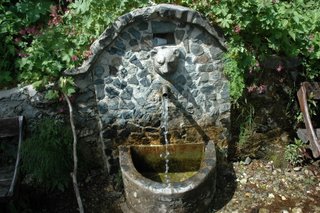 I met up with Sarah and her group in Kalofer and we began the long march out of town to the trailhead. As the PC, in its infinite wisdom, has failed to provide me with a helicopter, four-wheel drive vehicle or sherpa and I am prohibited, by PC regulation, from riding a donkey, I had no alternative but to shoulder my heavy pack and trudge along with the group. We marched out of town on a pleasant enough road that ran beside a pleasant enough river for most of its length. My pack was a bit heavy because I was carrying two cameras, extra clothing, water, a jacket and an umbrella. I also had a guidebook describing Hizha Rai, apparently on the offchance that I didn't quite understand what I was seeing when I got there!? Well, it seemed like a good idea when I put it in the pack. It took us an hour to reach the trailhead but the weather was fine and I was feeling pretty good about the whole adventure.
I met up with Sarah and her group in Kalofer and we began the long march out of town to the trailhead. As the PC, in its infinite wisdom, has failed to provide me with a helicopter, four-wheel drive vehicle or sherpa and I am prohibited, by PC regulation, from riding a donkey, I had no alternative but to shoulder my heavy pack and trudge along with the group. We marched out of town on a pleasant enough road that ran beside a pleasant enough river for most of its length. My pack was a bit heavy because I was carrying two cameras, extra clothing, water, a jacket and an umbrella. I also had a guidebook describing Hizha Rai, apparently on the offchance that I didn't quite understand what I was seeing when I got there!? Well, it seemed like a good idea when I put it in the pack. It took us an hour to reach the trailhead but the weather was fine and I was feeling pretty good about the whole adventure.
From the trailhead, Sarah and her Bulgarian friend, Koko, pointed out the waterfall we'd be hiking to and I stopped feeling pretty good about the damn adventure. Nonetheless, off we went and within five or six hours we'd arrived at Hizha Rai. There were five of us in our group and Hizha Rai happened to have a room for five, so I climbed onto the top bunk of one bed and swore that I wouldn't come down until the PC arranged to heli-vac me off the mountain. Andy, a twenty-something volunteer, shook me out of the
 bunk and said that we were all hiking to the base of the waterfall before dinner. Oh yeah!! Well, you can take your waterfall and shov....So, the waterfall was actually quite beautiful and I'm glad that I joined the party hiking up to it. One woman elected to stay behind and as a result she doesn't limp as badly as I do, but I got to stand beneath the waterfall, so there.
bunk and said that we were all hiking to the base of the waterfall before dinner. Oh yeah!! Well, you can take your waterfall and shov....So, the waterfall was actually quite beautiful and I'm glad that I joined the party hiking up to it. One woman elected to stay behind and as a result she doesn't limp as badly as I do, but I got to stand beneath the waterfall, so there.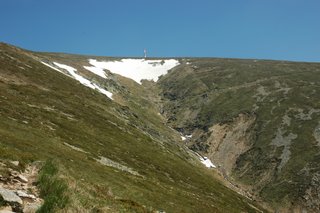 Sarah kept saying that we were hiking to Hizha Rai and Botev Vruk which I assumed was just the formal name for Hizha Rai. Hristo Botev is one of Bulgaria's national heroes who, like so many of Bulgaria's national heroes, led a foolhardy failed attempt to overthrow the Turkish Yoke and died a heroic and early death. Many streets are named after him. So, it turns out, is the highest peak in the Stara Planina. All along, the group had been planning to hike to Botev Vruk or Peak and the overnight at the Hizha was just to rest us up for the real climb the following day. I said that I would decide in the morning whether I was able to assault the mountain any further or whether I'd wait for them back at the hizha sampling the cold beer. The hizha was filled with nearly a hundred high school kids on an outing and the noise level would have drowned out jackhammers breaking concrete. In spite of that, I got several minutes sleep and woke feeling like I'd been beaten on the feet with sticks.
Sarah kept saying that we were hiking to Hizha Rai and Botev Vruk which I assumed was just the formal name for Hizha Rai. Hristo Botev is one of Bulgaria's national heroes who, like so many of Bulgaria's national heroes, led a foolhardy failed attempt to overthrow the Turkish Yoke and died a heroic and early death. Many streets are named after him. So, it turns out, is the highest peak in the Stara Planina. All along, the group had been planning to hike to Botev Vruk or Peak and the overnight at the Hizha was just to rest us up for the real climb the following day. I said that I would decide in the morning whether I was able to assault the mountain any further or whether I'd wait for them back at the hizha sampling the cold beer. The hizha was filled with nearly a hundred high school kids on an outing and the noise level would have drowned out jackhammers breaking concrete. In spite of that, I got several minutes sleep and woke feeling like I'd been beaten on the feet with sticks.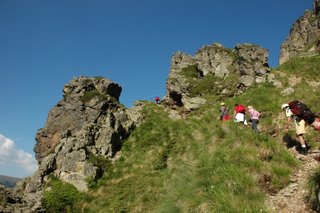
The same (intelligent) woman who'd declined the hike to the waterfall opted to remain behind again but I said I'd tag along. The hike to Botev Vruk was uphill all the way and it took almost three hours to reach a point where we could see the peak we were struggling towards. About two-thirds of the way up I began to seriously consider just lying down and dying rather than moving another foot. Sarah said to just keep putting one foot in front of the other and if I'd had the strength, I'd have hit her with a rock. She and Andy were climbing ahead of me and they had to keep stopping until I caught up. At one point I suggested bravely that they should just go on without me and they both said, "okay" and took off. This is why PCVs aren't issued rocket propelled grenades. I can remember sitting at home watching National Geographic specials on tv while smoking a cigar or eating a bowl of icecream and thinking, "how tough can that really be? Surely it's a matter of willing yourself to just keep going and to ignore the discomfort." When the camera would focus on one exhausted climber or another who had gotten to within a few meters of the top and just couldn't go any further I would think, "just suck it up and keep going you loser!" I have now learned that I cannot climb Mr. Everest. However, I finally made it to the Botev Vruk scant minutes behind Sarah and Andy and we sat on the stoop of a building and ate our sandwiches in silence. There was a second building on the peak and other hikers kept coming out of it carrying plastic cups of tea. We walked over and discovered that tea was being sold on the third floor. Why they didn't sell tea on the first floor is beyond my comprehension, but we wanted tea and honey quite badly at that point, so we climbed to the third floor. You could smell the tea brewing in a big pot on the stove as we entered the room. "Three teas with honey, please" I said as I entered the room. The woman looked right through me and said, "Are you Sarah?" Sarah 'fessed up and we were told that we couldn't have tea there, that we had to back to the building we'd started in because, "they're waiting for you there." No one could tell us who 'they' were, but we definitely weren't getting any tea in this building. So we went back down the three flights of stairs, over to the other building and entered the only door we could find.
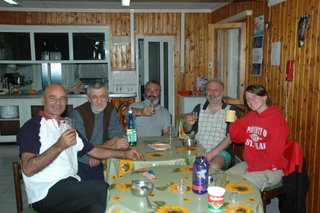 Suddenly we were Na Ghosti. We were part of a gathering of Bulgarian men about my age who were eating shopska salad and drinking homemade rakiya and wine. Never let anyone convince you that rakiya and wine don't mix well with mountain climbing, they actually improve one's ability to sing Bulgarian folk songs which has always been an integral part of climbing as everyone knows. So we felt obliged to stay and drink to everyone's health and tell stories and have a great Na Ghosti before falling back down the mountain. Going down was definitely easier and we actually only stopped at Hizha Rai for a bowl of soup and to pick up the slacker before continuing on down to Kalofer. We got back to Sarah's place well after dark which meant that except for the hour and a half Na Ghosti on Botev Vruk and the forty-five minute soup break at Hizha Rai, we'd hiked for just over fourteen hours. But I stood on the top of the monument on Botev Vruk and I have the picture to prove it.
Suddenly we were Na Ghosti. We were part of a gathering of Bulgarian men about my age who were eating shopska salad and drinking homemade rakiya and wine. Never let anyone convince you that rakiya and wine don't mix well with mountain climbing, they actually improve one's ability to sing Bulgarian folk songs which has always been an integral part of climbing as everyone knows. So we felt obliged to stay and drink to everyone's health and tell stories and have a great Na Ghosti before falling back down the mountain. Going down was definitely easier and we actually only stopped at Hizha Rai for a bowl of soup and to pick up the slacker before continuing on down to Kalofer. We got back to Sarah's place well after dark which meant that except for the hour and a half Na Ghosti on Botev Vruk and the forty-five minute soup break at Hizha Rai, we'd hiked for just over fourteen hours. But I stood on the top of the monument on Botev Vruk and I have the picture to prove it.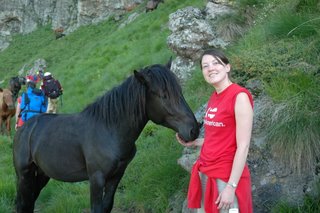

On the trail to Botev Vruk we had to hike through this herd of free roaming horses. They were savage as you can see.
Last week I participated in my group's COS conference. Close of Service is the terminology for leaving the PC and it appears to be as complicated and time-consuming as entering was. There are appointments to be made with medical, dental and vision doctors, forms to fill in and reports to fill out. Decisions on when to fly home and where to fly to have to be cast in stone. PC property such as fire extinguishers, smoke detectors, water purifiers, tamiflu and first aid kits have to be returned to Sofia. Host families have to be visited one last time and kissed good-bye. Stuff has to be sorted into piles to ship, pack, give away and burn. Final exit interviews with Program Managers and Country Director have to be scheduled and all the checklists have to be checked. Suddenly, quitting early (ETing) begins to have a bright side to it. I'll decide in the next day or so which day I'll actually leave Bulgaria and which city I'll fly into. I'll book my flight and begin counting down the days.
I still have twenty-two vacation days on the books, but I won't get to use most of them because I have a lot of things coming up in the next three months. I'm going to Borino, in the Rhodope Mountains, to help another volunteer out by showing his organization how to write a grant application. I'll be in Sofia the end of July to work in another Day Camp. My agency is getting busier with paying clients and I have a ton of work to do here. August and September are also beginning to fill up, so the time will fly by. I'm anxious to see my family and friends in the States again, but I don't really want this experience to be over. Slowly I'm completing my personal checklist and now the next mountain I climb will be my second.
I'll leave you with the words of my friend Jessica. I called her when I finally reached the summit to say that I wasn't sure I could survive the climb back down and that I was worried that I'd bitten off more than I could chew and might just be left to die there by the others and she said, "You think you have problems, my washing machine is acting up and I have a full load in!" That's what PC is all about, selfless devotion to the problems of others and obsessive fascination with Bulgarian appliances.

Sunday, June 11, 2006
Man Down!
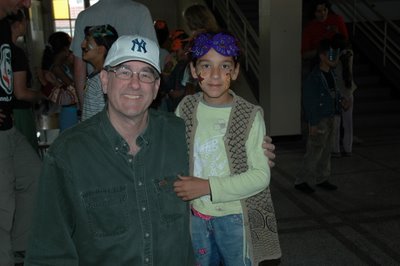
This much I know is true: YDs have more fun than the rest of us. There are three groups of volunteers, defined by the type of work they do, CODs or Community Organizational Development volunteers, TEFLs or Teachers of English as a Foreign Language and YDs or Youth Development volunteers. I was lucky enough to be invited to help out at Kate's YD Summer Camp in Plovdiv last week. This was a weeklong day camp held at a school in the Roma Mahala where Kate works. The kids were all fourth and fifth graders from the neighborhood and came armed with enough energy and high spirits to power an aircraft carrier for a day. Unless you happened to be Kate, it really wasn't much like work at all. The ten or so volunteers who came to help out got to run around and play just as much as the ten year old kids. Kate had already done all the planning and the rest of us just did what we were told. In case you're interested, there seem to be about one hundred variations to the game of Tag and we played them all.
Years ago, while legging out a triple in a highly competitive game of co-ed softball, I had the unfortunate experience of tearing my hamstring. With my completely unsympathetic teammates screaming at me to "crawl faster!", I dragged myself along the ground to third base and was immediately pulled from the game for a pinch runner. A torn hamstring hurts like the devil. It feels exactly like someone has snuck up behind you and cut through that large heavy muscle with a pair of dull scissors. At first the muscle just flops around under your skin like a snake in a bag but then the pain message reaches your brain and you really don't care much at all for people who want you to "crawl faster". Anyway, ever since that day I have taken great care to a) preferably not run at all or b) if running was to be absolutely required, to warm up my legs for at least a week before said running was to occur.

Have you ever tried to play any of the myriad variations of Tag without actually running? The kids screamed and yelled and charged around the schoolyard like inmates escaped from the asylum. The volunteers screamed and yelled and ran for their lives. We played Partner Tag, Blob Tag, and a game called Sharks & Minnows that sounds a lot cooler in Bulgarian - Akula!! It became quickly apparent that the true purpose of each and every one of those games was to cause Larry a serious injury. As one swift little bast.. child came up and tagged me from behind, I knew it was only a matter of time before I would be found lying in a pool of my own tears with a group of completely unsympathetic ten year olds hovering over me yelling "crawl faster!". Then I had a vision of the PC medically separating me with less than six months to go because I tore a hamstring playing Blob Tag!
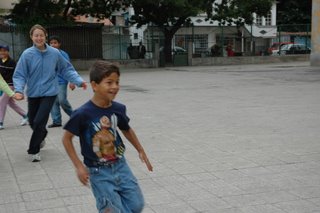
I faked a limp and left the field of battle to take up a position behind the camera. Hiding behind the "they also serve who sit and do nothing" theory of participation, I filmed and photographed away for two days. The kids had a ball. The volunteers had a ball. Kate was exhausted from all the work she put into the camp as well as having two or three volunteers staying at her apartment the whole week and I finished the camp with both hamstrings intact. We're all winners in this game.
 By the way, each of the two big bullies shown in the picture on the left tagged me really hard and then laughed at me. Actually, these were two of the younger kids and the older kids tried to be very careful not to hurt them. In Bulgaria, the girls seem to pair off at birth and you almost never see a girl without her mate. During a particularly competitive round of Steal The Bacon a girl and her best friend found themselves on opposite teams. Worse yet, they were the same number which meant that when their number was called they would have to go against each other. Their number was called and both of them charged out for the Bacon. One girl swooped it up and began running back to her line but her friend was hot on her heels and leveled her with a whacking strong tag. The tagged girl went down like a shot duck and stayed down. Her friend began to cry and both girls had to leave the field of play, arm in arm, to compose themselves. No one ev
By the way, each of the two big bullies shown in the picture on the left tagged me really hard and then laughed at me. Actually, these were two of the younger kids and the older kids tried to be very careful not to hurt them. In Bulgaria, the girls seem to pair off at birth and you almost never see a girl without her mate. During a particularly competitive round of Steal The Bacon a girl and her best friend found themselves on opposite teams. Worse yet, they were the same number which meant that when their number was called they would have to go against each other. Their number was called and both of them charged out for the Bacon. One girl swooped it up and began running back to her line but her friend was hot on her heels and leveled her with a whacking strong tag. The tagged girl went down like a shot duck and stayed down. Her friend began to cry and both girls had to leave the field of play, arm in arm, to compose themselves. No one ev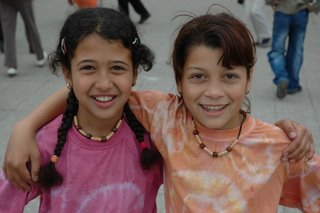 er said Steal The Bacon was a game for softies. Eventually the two girls returned, but they declined further combat and restricted themselves to an afternoon of crafts.
er said Steal The Bacon was a game for softies. Eventually the two girls returned, but they declined further combat and restricted themselves to an afternoon of crafts.The strain of the week proved to be too much for Kate and, in what can only be described as a moment of insanity, she actually gave the kids ammunition for a game of Egg Toss and then provided them with water balloons for a game of Soak the Volunteers! We filled several buckets with multi-colored water balloons and brought them down to the playground for the last outdoor activity of the camp. I carried one bucket out and tried to hold it up high enough so none of the kids could begin grabbing the balloons. Within seconds I resembled a tree decorated with colorful Roma children as ornaments. Ten seconds after I hit the playground, all my balloons were in the hands of the enemy and I was limping for cover. It took half a dozen volunteers the better part of an hour to fill the balloons, it took the kids twenty-eight seconds (by the clock) to fire them all at friends and foe alike.
In addition to the outdoor mayhem, there were indoor activities every day. The kids made necklaces, painted their faces, made masks, played bingo and had a discoteque on the last afternoon. The thing that impressed me the most was that none of the kids acted bored or decided that they were too cool to take part in any of the activities. Boys who acted like little thugs when they were playing the Tag games outside, became fully engrossed in decorating their masks when it was time for crafts.
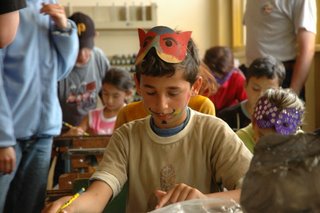
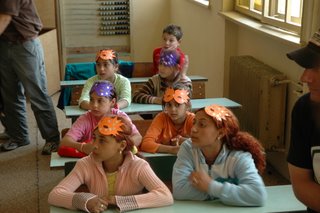
I think that they all just enjoyed having people pay attention to them and that they appreciated the effort that Kate put into making their weeklong camp special. They live in a neighborhood where many of the things that happen are pretty negative so this camp gave them a week of safe, supervised activities where they could scream and yell and run around like crazy and no one would punish them for it. Apart from the very fine level of behavior shown by the kids, something else was equally apparent. The kids were very open in showing their affection for the Volunteers who worked at the camp. Volunteers were constantly being hugged by two or three small people whenever the opportunity presented itself. Lincoln, Jennifer, Jessica, Matt, Dave and Apryl generally had a couple of small admirers clinging to them whenever we were between games. The hugging was spontaneous and affectionate with each Volunteer having his or her own little fan club.
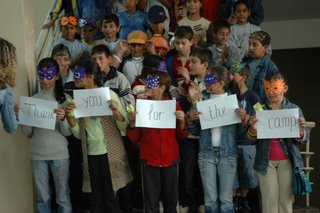 The camp actually followed close on the heels of a few weeks of insanity of another stripe as I had visits from my sons and then my parents run end to end. Andy and Ian finally made it to Bulgaria after almost two years of promising to come. My foks made their second trip here in two years and would surely come again if I were staying. Both sons and parents made the pilgrimage to Saedinenie to visit my host family and both left laden with bottles of domashna (homemade
The camp actually followed close on the heels of a few weeks of insanity of another stripe as I had visits from my sons and then my parents run end to end. Andy and Ian finally made it to Bulgaria after almost two years of promising to come. My foks made their second trip here in two years and would surely come again if I were staying. Both sons and parents made the pilgrimage to Saedinenie to visit my host family and both left laden with bottles of domashna (homemade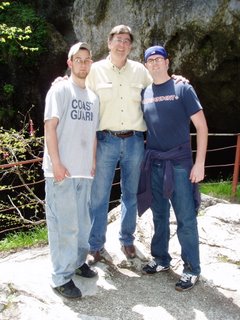 ) wine and rakiya.
) wine and rakiya.The boys and I rented a car and Andy drove us down through the Rhodopi Mountains to Chepelare, Trigrad and Yagodina. We hiked and climbed around and over the Miraculous Bridges and wandered around the mountain in the rain. Later we found a small
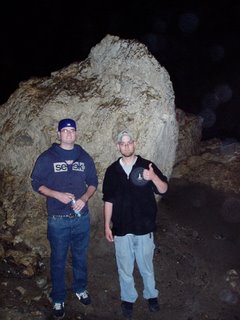 hotel and the boys stayed up and drank beer with the owner in his bar while I got some sleep. While still in Chepelare, we went through the Cave Museum which is proudly billed as the finest of its kind in Europe. In small print it is noted that it is the 'only' cave museum in Europe. It's a couple of rooms on the ground floor of a hotel that have been painted black and decorated with pictures of stalactites and stalagmites. Oh, and it has the skull of a cave bear in a glass case. We did manage to visit some 'actual' caves and rode through some truly spectacular gorges. During our stay in Trigrad, the hotel owner broke open a bottle of rakiya and the boys felt obligated to drink to his health, then to their own health and finally to the general health of the world at large not excluding ficticious characters and possible visiting aliens. As Ian later explained, "It was really weak stuff, Dad. With Stoil's homemade rakiya you can't even breathe after you drink, with this stuff we could still talk!!" They have become true fans of Veneta and Stoil after spending one very pleasant afternoon and evening visiting with them.
hotel and the boys stayed up and drank beer with the owner in his bar while I got some sleep. While still in Chepelare, we went through the Cave Museum which is proudly billed as the finest of its kind in Europe. In small print it is noted that it is the 'only' cave museum in Europe. It's a couple of rooms on the ground floor of a hotel that have been painted black and decorated with pictures of stalactites and stalagmites. Oh, and it has the skull of a cave bear in a glass case. We did manage to visit some 'actual' caves and rode through some truly spectacular gorges. During our stay in Trigrad, the hotel owner broke open a bottle of rakiya and the boys felt obligated to drink to his health, then to their own health and finally to the general health of the world at large not excluding ficticious characters and possible visiting aliens. As Ian later explained, "It was really weak stuff, Dad. With Stoil's homemade rakiya you can't even breathe after you drink, with this stuff we could still talk!!" They have become true fans of Veneta and Stoil after spending one very pleasant afternoon and evening visiting with them.I told Veneta that we'd get there after lunch and stay for dinner and overnight. I knew that we'd be having lunch with Brian in Plovdiv on the way to Saedinenie and didn't want Veneta to make food we wouldn't eat. However, I warned the boys to eat lightly because Veneta would probably fix something anyway. She was standing on the curb watching for us as we pulled up and began handing us plates of food on our way into the house! Ten hours later we were all in food-induced comas and begging for mercy. It's good to go home!
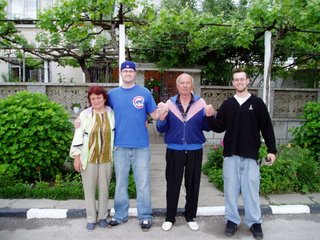
My folks arrived during the boys' last three days and we all spent some time together in Sofia. We rented the hotel owner's car and Andy drove us down to Rila Monastery. Surprisingly, lightening didn't strike Andy or Ian down in that holy place. I guess the Saints weren't paying attention that day. On Friday morning the boys left for home and on Saturday The Visit: Chapter Two began with a bus ride with my folks to Stara Zagora.
Don is still recovering from his illness of a year ago and Mom is recovering from a broken pelvis so this visit was conducted at a more leisurely pace than their previous trip to Bulgaria. We still managed to see Sofia, the Rila Monastery, Varna, Saedinenie (required) and Assenovgrad. By the time they left for the States, they both seemed to be a lot stronger and were getting around much more easily. While neither
 of them are big rakiya fans, they do love Stoil's red wine and he gave them a ten liter bottle of it to take back home. Sadly, there was no way for them to transport such a large amount of vino on the plane and I am going to have to find a way to dispose of it myself. I'll have a few friends over and ask for suggestions.
of them are big rakiya fans, they do love Stoil's red wine and he gave them a ten liter bottle of it to take back home. Sadly, there was no way for them to transport such a large amount of vino on the plane and I am going to have to find a way to dispose of it myself. I'll have a few friends over and ask for suggestions.
So now for me it's back to the grind. I really have to do some work at the agency, if only to justify the use of my desk. I also have to begin preparing myself psychologically to re-enter a world where people don't sit over a cup of coffee for a couple of hours at the cafe or visit their friends for ten or twelve hours at a crack, a world where people move as efficiently as possible when going from A to B and rarely find the time to stop on the sidewalk to discuss matters of small importance. Of course, I have a plan. I've come to prefer the more leisurely pace and therefore, when I feel pressured to hurry or hustle along, I'll pull up with a brave limp and explain that I can't move any faster because, "when I was working with some kids at a summer camp, I was severly injured when a game of Egg Toss spiraled badly out of control. Let's stop here for a coffee and I'll tell you all about it."
Thursday, May 11, 2006
We Start Work At 8:30!
I was walking to work in a great mood. The weather was gorgeous and I was actually whistling as I went along. It was one of those beautiful Spring days when the sun was out and the morning air was crisp and clean. I was wearing a light jacket and jeans and, as I walked, I was thinking about my sons' upcoming visit. Then something hit my head.
It wasn't a thought because a thought wouldn't have been so viscuous and gooey. A thought would have been less tangible than the very tangible thing that hit my head and oozed down into my hair. No, the thing that hit my head was more on the order of very tangible birdshit. I can't swear that it was from a bird, judging from the size of the mess, it might have been from a small winged hippopotamus.
When I felt the 'thing' hit my hair, my reaction was to put my hand up to feel around to identify the 'thing'. I suspect you might have reacted similarly and now I understand how a wolverine can be induced to chew off its own paw. All I'll say on the subject is that when I saw the mess on my hand and realized what was spread like a beanie across my head, I stopped whistling and the day lost a lot of its luster. I ran back home, jumped into the shower and began to shampoo the real poo out of my hair. For almost an hour, I had to fight off the urge to shave my head. Then I very calmly got dressed and went to work.
My colleagues were in a great mood when I arrived at the office because we have finally acquired our first paying client! This was a banner occasion and called for an out-of-office celebration. We are contacted by many foreign companies seeking information or assistance regarding moving to Bulgaria in general and Stara Zagora in particular. We do the research and send back our replies, we set up contacts, agendas, hotel reservations and meetings. We escort visitors around and translate for them during their meetings. We negotiate on their behalf. We do all this without any compensation from anyone. REDA lives off of its ability to acquire EU funding for specific projects and when we don't acquire projects during a cycle, we don't receive any income. We are not supported by the government on any level, local, regional or national. Our objective is to become self-sustainable and wean ourselves from our dependence on grant money.
As a first step towards achieving this independence, we have developed list of services that we are uniquely qualified to offer and a modest fee schedule to go along with them. Now, when we're contacted by foreign companies seeking information, we send back a complimentary first general reply and then offer to represent them locally and send along our standard fee schedule. My colleagues were, initially, concerned when most of the companies receiving the fee schedule didn't contact us again. I kept trying to explain that these companies were only interested in having us do an enormous amount of work for them if they didn't have to pay for it. The world is filled with 'customers' like that and you only stay in business if you avoid them. We offer a genuine value to companies through our network of contacts and our top to bottom knowledge of the region. We have the ability to provide in-depth research on any issue of interest to a foreign investor more accurately and in far less time than they can do for themselves. I have been convincing my colleagues that we should only expend our efforts on behalf of companies who recognize our worth.
A British firm has decided to build a Health Spa in our Region and to surround it with a development of new single family houses. They have paid us for all the work we've done on their behalf to date and asked us to represent them throughout the entire project. It's hard to describe how excited we are about this. I even began to whistle again.
I began this entry over two weeks ago and then my sons arrived and then my parents arrived and then my sons left and now I'm showing my folks around. And then the dog ate my homework.
One final observation. When Andy and Ian were here we noticed that we walk differently than most Bulgarians. We tend to walk quickly to wherever we're going. We talk along the way, but we don't waste time or steps. The purpose of walking out to TechnoMarket, for example, is to get to TechnoMarket. Bulgarians stroll. They amble, wander and mosey. Young women walk arm in arm and speak to each other in whispers. Old men also walk along arm in arm and re-live old battles won or lost. Periodically, all Bulgarian walkers stop and have conversations that require the participants to be stationary. We hammer along from A to B with the objective of arriving as soon as possible. For Bulgarians, the getting there is half the fun. I've noticed this as I've rushed past most of the population of Stara Zagora on my very important missions to get to one place or another. There are roses in full bloom on every vine in the city and I haven't bothered to appreciate a one of them. So, I have made a promise to myself to slow it down and to be more Bulgarian in my getting from A to B. I intend to literally stop and smell a few roses along the way.
The only apparent drawback to this is that is makes me a much easier target...say, are those large birds flying this way?!
Thursday, May 04, 2006
Building Bloks
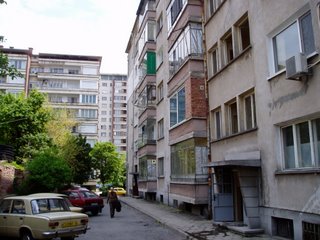
Concrete is remarkably durable and will be crumbling down and decaying throughout Eastern Europe for centuries to come. Most of the major buildings in Stara Zagora are made of concrete and were designed by men and women with excellent political backgrounds and a presumed talent in some field other than architecture. They are truly ugly, cheerless and totally lacking in inspiration or art. But they are functional. And the homes inside these buildings are just like homes anywhere else. People here have the same appliances, electronics, fixtures, plumbing, rugs and tiles that people acquire wherever they live. People own the interiors of their apartments but haven't quite formed the co-ops necessary to keep the exteriors and public areas (elevators, hallways, entryways, etc.) in a livable condition. Perhaps they don't yet understand the relationship between the value of their own apartment and the appearance of the common areas of the building.
I pay three leva a month towards the cleaning of the common areas of my building. We recently had our entryway repainted and locks installed on the exterior doors. Grass was planted on a small island in the parking lot that had previously been used as an ad hoc trash bin. Every so often, a collection is taken up to pay for one or another improvement and signs are always posted on the elevator doors tattling on the apartment owners who refused to chip in. Discussions are held in hallways and on the benchs by the fountain outside and little by little the building is improved and a stubborn few skulk along for the free ride. I am usually exempted from contributing because I am a 'renter', not an owner. However, my next door neighbor is in charge of collecting for our floor and I can usually convince her to let me put in my share. Before you become all teary-eyed over my generosity, a share is never more than five leva or about three bucks.
Stara Zagora is changing. New buildings are being built all over town. Roads, sidewalks, parks and plazas are being improved and upgraded. Gray concrete pillboxes and bunkers are being replaced by buildings with curves and colors. Older pre-communist architecture is being rediscovered and renovated and the town is starting to assume an identity of its own. Or maybe it's just Spring.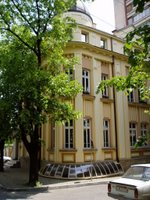
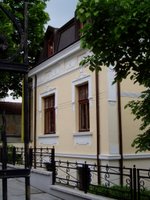
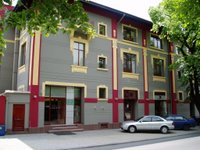
From my balcony I look down on a building that was an eyesore and was torn down to make way for new construction. My street, Metropolit Metodii Kucev, is a beautiful divided two lane road with a tree-lined path containing half a dozen ornate fountains running down the center. It begins up at Ayazmoto Park and runs past my building down into the center of town. Property values on Metodii Kucev are understandably high. Buying property is sometimes difficult because of the title disputes arising from ownership claims from the times before, during and after communism. However, on this particular building title was proven and the developer tore it down and began to prepare the site for his new building. Just as a property developer in the States, he cleaned off the old rubble and dug an excavation for a new foundation.
Unfortunately, that's when he ran into the Roman ruins. So now, all work has been temporarily halted while the site is excavated with whisk brooms and dental picks. These aren't as efficient as backhoes and steamshovels, but they do less damage to priceless antiquities.
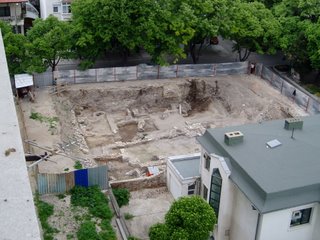
You've probably figured out by now that the whole reason I'm writing this piece about architecture and building sites is that I just learned how to put pictures on my journal! My little digital camera had stopped working and I assumed that the battery was worn out. I hiked all over town looking for a replacement, couldn't find one and asked my sons to buy me one and bring it with them when they visit. Then, the old battery took a full charge and has been working perfectly ever since. Go figure! I have no idea how or why any of this stuff works and that's why it's taken me two years to figure out how to put pictures on this page.
REDA, my agency, is thinking of requesting another volunteer. This is a great place to work and my colleagues will see to it that the new person is kept busy. We are transitioning from a purely grant supported operation to a self-sustained consulting agency and there will be plenty of work for another volunteer for the next couple of years. REDA has to find its niche because much of what we do is covered by the Chamber of Commerce and some of what we do is now done by the brand new Tourist Office that opened next door to the Gallery. In my opinion, our niche is pursuing and attracting foreign investment and then assisting those investors in making contacts and working through the labyrinth of laws and regulations necessary to begin doing business in Stara Zagora. Information and contacts, in this day and age, are very saleable commodities and REDA has both in abundance. However, change is difficult and even though we have taught courses in Change Management, we are having a bit of difficulty in facing the future ourselves.
It's Friday and we're shutting down for the weekend. We're closing before six o'clock because Darina's daughter Nadia just turned seventeen and is having a party at their apartment that requires Darina and her husband to vacate the premises. Petya and I spent most of the day telling her horror stories of our own children's unsupervised parties (because that's what teammates are for) and Darina left looking as happy as a soldier on a suicide mission.
Next week should be relatively slow here and then my sons arrive. They'll come in on Saturday and stay for two weeks with my folks arriving during the boys' last three days. Then my folks will stay until the first week or so of June and then I'll have a couple of weeks before my COS conference in July. Time's flying!!
The cafes are open and I'm going to go find a chair and a cup of coffee and watch the sights stroll by. Have a great weekend, everyone.
